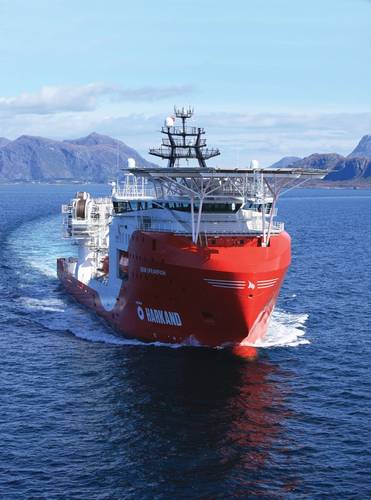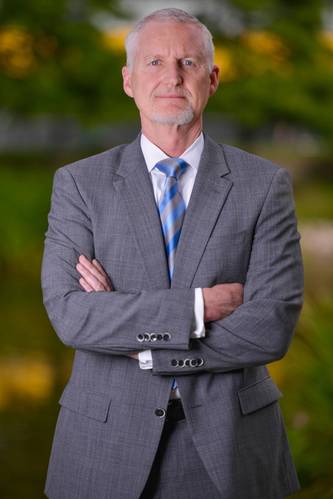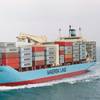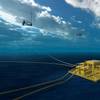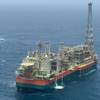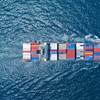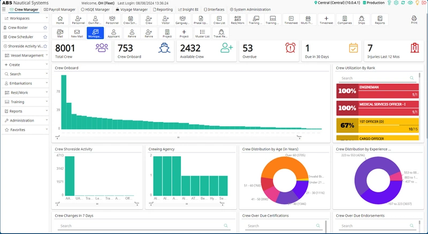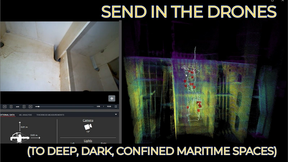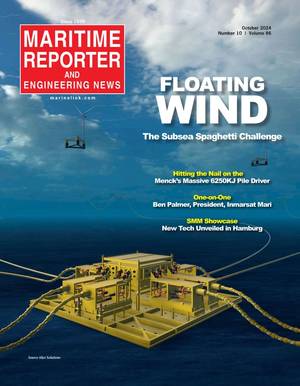Harkand: Expanding the Fleet, Growing a Global Business
International inspection, repair and maintenance (IRM) company Harkand aims to be a $1 billion company. MR’s Tom Mulligan recently met with John Reed, the company’s CEO, to discuss his vision for the future and how Harkand aims to achieve its goal of being the leading subsea IRM and light construction contractor globally.
Established in 2012 and headquartered in London with operations bases in Aberdeen, Houston, Mexico, and Ghana, global subsea IRM group Harkand has been expanding its business operations rapidly throughout North America, Africa, the Asia Pacific and Europe, having won major contracts for its services and increasing its infrastructure supporting the oil, gas and renewable energy industries.
Harkand’s expertise is in subsea inspection, repair and maintenance as well as light construction, construction support and survey services, using high-specification assets. The company is constantly looking to expand its business to offer new capabilities and create new business opportunities.
Growing Business, Expanding Infrastructure
John Reed, Harkand’s CEO, said the dominant economic factor affecting the industry is the energy demand/supply imbalance: “While major oil producers such as Saudi Arabia generally regard such an oversupply as an existential threat to their business, there are new factors affecting the economic situation such as the high growth in shale oil and gas production, which has become a surprisingly large contributor to the supply side.”
“Harkand’s whole premise is to be a significant part of the global IRM and light construction industry. We aim to grow the business based on the continuing expansion of the infrastructure and the need to maintain the aging infrastructure. This provides the baseline for our growth, which is cyclically enhanced by development project timing. The IRM sector is not immune to the downturn in the market, however our activities support the production of our client’s cheapest barrels.
“Over the next 2-3 years, fleet-wise Harkand will operate more or less the same number of vessels as at present, although this will, of course, depend on how long the downturn lasts. We will look to expand the business through acquisitions of companies and/or assets. At present we have one new-build on order, the Harkand Haldane, but I don’t envisage us placing any other new orders in the coming 2-3 year period. We may, however, acquire companies with particular types of assets, either DSVs or multipurpose vessels.
“Currently, our main geographic areas of operation are the North Sea and the Gulf of Mexico, as well as in West Africa, specifically off the coasts of Ghana and Nigeria, though we are also looking at working in Angola, which is a more resilient market with continuing activity. We aim to become a sustainable player in the West African region.
“Our goal is to expand our footprint even during the downturn. We believe this is doable.”
First Mexico Campaign
A recent example of such an expansion is the signing by Harkand of a joint venture with Arena Servicios de Mexico and the commencement in April of the company’s first campaign in Mexico as Harkand Arena after winning a $5 million contract with offshore construction company Swiber Offshore Mexico S.A de C.V. The work will include the installation of risers and expansion spools to the Ayatsil Field located in the waters of Campeche Sound. All onshore support including the project management and engineering will be performed by Harkand Arena personnel from its new office in Ciudad del Carmen, Mexico. The project will be performed utilising a portable saturation diving system to be provided by Harkand on board the client’s vessel. The project includes an option to use Harkand’s DSV Swordfish.
Also this year, Harkand secured a multimillion dollar contract with Maersk Oil North Sea Ltd. for the provision of dive support vessel services in the North Sea region. The 12-month contract will be serviced by Harkand’s two DSVs, the Harkand Da Vinci and Harkand Atlantis, supported by project management and engineering from Harkand’s Aberdeen office. The contract covers well tie-ins, structure installation, piling, flexible flowline lay, flexible riser installation, pre-commissioning, riser recovery, decommissioning and general inspection, repair and maintenance (IRM) work. The Harkand DaVinci and Harkand Atlantis are both equipped with state-of-the-art saturation diving systems, 140-metric-ton active heave compensated cranes and Super Mohawk ROV spreads.
In an extension to its work with Maersk Oil in the North Sea region, in June Harkand commenced decommissioning work in the U.K. Continental Shelf supporting Maersk’s work in the Leadon field. This new contract will see Harkand deliver project management and engineering services to the Danish-owned oil and gas company around its drill rig program for subsea well plug and abandonment. With an estimated 500-690 facilities reaching the end of their operational life over the next three decades, North Sea asset decommissioning projects are expected to play a large part in Harkand’s future.
“It comes back to the basis that the IRM sector always has some level of activity regardless of the price of oil as our clients try to operate efficiently and maintain current production. Our company is built around that feature of the industry. However, it’s vitally important to reduce costs in these circumstances and it’s essential to be as ‘lean and mean’ as you can,” says Reed. “Of course current market conditions can delay your investment decisions, but Harkand has a unique perspective because the company is backed by private equity. We can identify business opportunities, make the case for funding to our owner, and if approved, make suitable acquisitions.”
Strategic Initiatives & Acquisitions
Reed said there are two parts to continued growth of the company’s business: “First, there is the drive to continue our strategic initiatives and expand our footprint, as I’ve already described; and second, the acquisition of more vessels or of companies - we will continue evaluating opportunities and make conscious decisions on whether to make offers or not. Mexico, for example, potentially has some very good opportunities and has a massive shallow-water infrastructure. However, it also needs deepwater technology, infrastructure and investment. This is mostly achieved through licensing rounds and foreign investment, the IOCs likely being the major source of funding. Harkand is very well established on the service side, we have the fleet to meet both diving and deepwater requirements, and so we are very well prepared to take advantage of the opportunities in Mexico.”
To support its new activities, Harkand has awarded a contract to global shipbuilders Vard Holdings Limited (VARD) for one diving support and construction vessel (DSV), with options for a second. Delivery of the first vessel, the Harkand Haldane, is scheduled for Q2 2016. The deal represents an investment of $200 million per vessel, including additional plant and equipment, and is the latest in a series of investments in the growth of the company’s global vessel and ROV fleet, including the long-term charter of the Siem Spearfish for its U.S. operations.
Meeting Diving Services Needs
“Diving services are at the core of our IRM services. Following the very successful deployment of the Harkand Atlantis in the North Sea and Harkand Da Vinci in Africa after their delivery in 2011, we aim at further expanding our capacity in the high-end DSV market, especially the North Sea,” said Reed. “The Haldane takes on the proven characteristics of Atlantis and Da Vinci, and adds a number of improvements. The investment we are making in our business both in terms of our people and our assets underlines our commitment to create a modern, safe and efficient fleet that meets the highest standards of our customers on a global basis.”
The contract brings Harkand’s investment in its global operations since its formation to more than $300 million, boosting its vessel fleet to eight and its ROV fleet to 32.
“This latest dedicated vessel will not only be instrumental in responding to our growing number of projects in the North Sea and globally, it will address the shortcomings of DSV supply, both in quantity and quality, that exist in the current market,” Reed said.“ This will allow us to continue to offer the latest innovations in subsea technology through a state-of-the-art fleet both now and in the future.”
The vessel is of VARD 3 03 design, specially designed and equipped for diving and subsea operation duties with a high focus on good sea-keeping abilities, excellent station keeping performance and low fuel consumption. It will be fitted with a 250-metric-ton offshore crane, an ROV hangar and a Twin Bell 18 Man Saturation Diving System capable of supporting split level diving operations to a maximum diving depth of 300 meters. In addition to diving support, the vessel also has deepwater capability with the 250-metric-ton crane having 3,000 meters of wire, meaning it can perform work both in shallow water as well as deepwater ROV-related tasks.
“The Harkand Haldane is a very high-spec DSV which will likely operate in the North Sea,” said Reed, “but there will be demand for its use in other regional areas due to its high flexibility, a key consideration in a downturned market.
Multiregional Ops, Regionally Focused
“Our vision since the very beginnings of the company has been to make Harkand a $1 billion business, and to do that means we have to be multiregional. IRM is a regionally focused business, so we need to be front-facing in each region, and we achieve this through the operation of local regional offices supplying customized services and operating customized vessels to meet local needs. We are a full-service IRM company providing integrated solutions to clients in the oil, gas and renewable energy sectors – there is the space available for a worldwide player serving all regions in a full-service way, and this has been our vision since our founding in 2012.”
Meet John Reed, CEO of Harkand
John Reed is the CEO of Harkand and has been with the company since October 2013. He has more than 30 years of experience in the offshore engineering and construction sector, developing and delivering large-scale capital intensive projects and managing major complex organizations.
Previous to Harkand, he served on the Board of Directors of Cal Dive International Inc.c from May 2012 to August 2013. Prior to that he was CEO of Global Industries Ltd. from March 2010 until its acquisition by Technip SA. He is also a former CEO of Heerema Marine Contractors.
He has previously served as a member of the Board of Directors of the National Ocean Industries Association, is a past President of the International Pipeline and Marine Contractors Association and past Chairman of the International Marine Contractors Association, America’s Deepwater Division. He holds a Bachelors’ Degree in Engineering from the University of Mississippi and an MBA from Delta State University.
(As published in the August 2015 edition of Maritime Reporter & Engineering News - http://magazines.marinelink.com/Magazines/MaritimeReporter)





